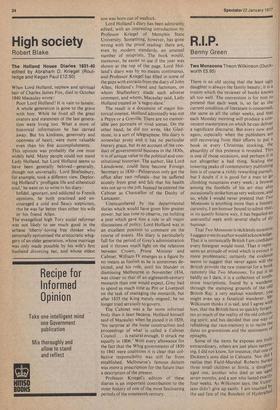High society
Robert Blake
The Holland House Diaries 1831-40 edited by Abraham D. Kriegel (Routledge and Kegan Paul 02.50) When Lord Holland, nephew and spiritual heir of Charles James Fox, died in October 1840 Macaulay wrote:' Poor Lord Holland! It is vain to lament. A whole generation is gone to the grave with him. While he lived all the great orators and statesmen of the last generation were living too. What a store of historical information he has carried away. But his kindness, generosity and openness of heart, were more valuable even than his fine accomplishments.
This opinion was probably the one most widely held. Many people could not stand Lady Holland, but Lord Holland seems to have been generally beloved—generally, though not universally. Lord Shaftesbury, for example, took a different view. Deplor ing Holland's 'profligate life and atheistical soul,' he went on to write in his diary:
Infidel, ignorant, and addicted to French opinions, he both practised and encouraged a cold and Saucy scepticism, tho he was far better than either his wife or his friend Allen.
The' evangelical high Tory social reformer was not likely to see much good in the urbane liberty'-loving free thinker who personally epitomised the aristocratic whiggery of an older generation, whose marriage was only made possible by his wife's first husband divorcing her, and whose eldest son was born out of wedlock.
Lord Holland's diary has been admirably edited, with an interesting introduction by Professor Kriegel of Memphis State University. Something, however, has gone wrong with the proof reading: there are, even by modern standards, an unusual number of misprints.. The book would, moreover, be easier to use if the year was shown at the top of the page. Lord Holland's diary was by no means continuous, and Professor Kriegel has filled in some of the gaps with extracts from the diary ofJohn Allen, Holland's friend and factotum, on whom Shaftesbury made such adverse comment, and whom, Macaulay said, Lady Holland treated as 'a negro slave.'
The result is a document of major historical interest. Holland admittedly was not a Pepys or a Greville. There are no memorable pen portraits or vivid scenes. On the other hand, he did not write, like Gladstone, in a sort of telegraphese. His diary is somewhat prosy and it has no particular literary grace, but as an account of the conduct of governmental business in the 1830s, it is of unique value to the political and constitutional historian. The author, like Lord Lansdowne, could have become Foreign Secretary in 1830—Palmerston only got the office after two refusals--but he suffered acutely from gout and felt that his health was not up to the job. Instead he entered the Cabinet as Chancellor of the Duchy of Lancaster.
Unencumbered by the departmental duties which would have given him greater power, but less time to observe, yet holding a post which gave him a role in all major discussions of policy, Lord Holland was in an excellent position to comment on the course of events. His diary is particularly full for the period of Grey's administration and it throws much light on the relations between Crown, Prime Minister and Cabinet. William IV emerges as a figure by no means as foolish as he is sometimes depicted, and his role, until his blunder in dismissing Melbourne in November 1834, was closer to that of an eighteenth-century monarch than one would expect. Grey had to spend as much time as Pitt or Liverpool on the task of managing the monarch, but after 1835 the King merely reigned; he no longer tried seriously to govern.
The Cabinet was a far more informal body than it later became. Holland himself said of Macaulay when he joined it in 1839, his surprise at the loose construction and proceedings of what is called a Cabinet Council . .. is natural enough. It struck me equally in I806.' With every allowance for the fact that the Whig governments of 1830 to 1841 were coalitions it is clear that collective responsibility was still far from established. Melbourne's famous dictum was more a prescription for the future than a description of the present.
Professor Kriegel's edition of these diaries is an important contribution to the inner history of one of the most fascinating periods of the nineteenth century.


































 Previous page
Previous page